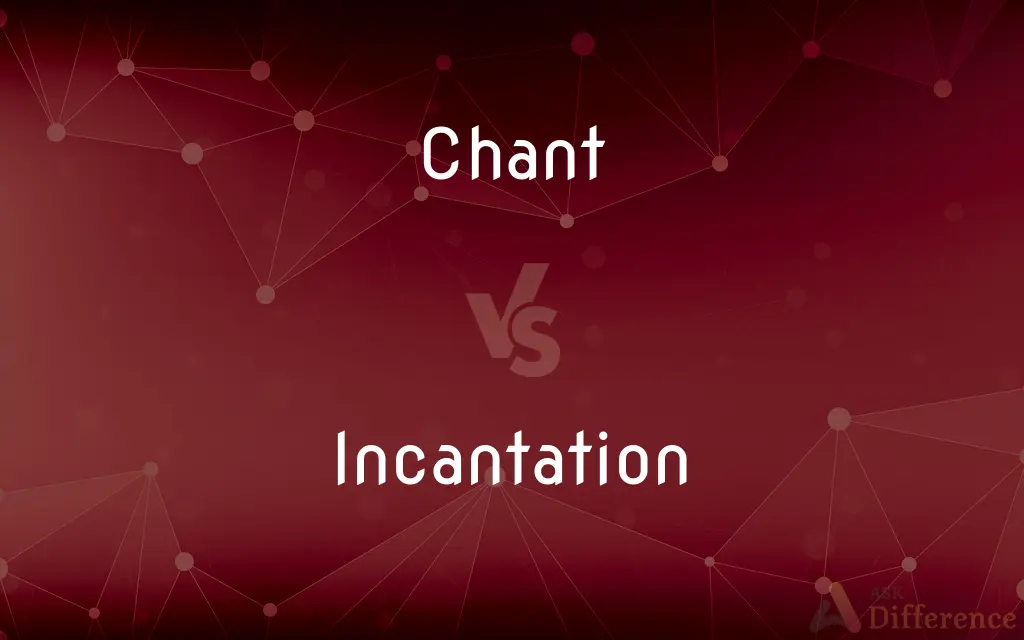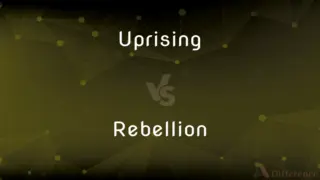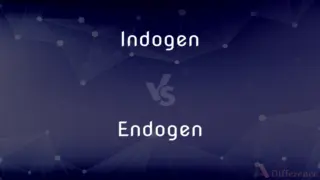Chant vs. Incantation — What's the Difference?
By Tayyaba Rehman & Fiza Rafique — Updated on March 31, 2024
Chants are repetitive songs or melodies, often with religious significance, while incantations are magical spells spoken or sung to invoke supernatural powers.

Difference Between Chant and Incantation
Table of Contents
ADVERTISEMENT
Key Differences
Chants are musical or rhythmic recitations of words or sounds, frequently used in religious or spiritual contexts to express devotion, prayer, or meditative focus. They are often simple, repetitive, and designed to facilitate collective participation or personal meditation. Incantations, on the other hand, are phrases or series of words believed to have magical power, used in ritualistic ceremonies or spell-casting to bring about specific effects or to invoke supernatural entities.
While chants can be a part of many cultural and religious traditions—serving to unite participants in a common experience or to enhance the spiritual atmosphere of a ceremony—incantations are specifically intended to harness mystical or magical forces. Incantations are often crafted with careful attention to the language, rhythm, and sometimes secrecy, believed to be essential for their effectiveness. Chants, in contrast, are usually more open and shared within communities as part of worship, celebration, or spiritual practice.
Chants often serve to preserve and transmit traditional or religious knowledge, embedding moral values, historical events, or sacred texts in easily memorizable forms. They can be part of rituals, ceremonies, or daily practices, sometimes without any supposed supernatural effect but rather for unity, education, or spiritual enrichment. Incantations, however, are typically employed for specific purposes—such as healing, protection, or influencing the course of events—and their power is believed to derive from the intrinsic properties of the words, the manner of their delivery, or their alignment with cosmic forces.
The practice of chanting can be found globally across various religions and spiritual paths, including Buddhism, Hinduism, Christianity, and Islam, each with its own distinct forms and purposes. These chants range from the recitation of prayers and scriptures to the singing of hymns and mantras, all intended to uplift, inspire, or deepen spiritual practice. Incantations, while also found worldwide, are more closely associated with esoteric traditions, witchcraft, shamanism, and ceremonial magic, where the precise formulation and execution of words are believed to impact the metaphysical world directly.
Despite their differences, both chants and incantations can involve deep cultural and spiritual significance, with the power of voice and rhythm being central to their practice. Whether aimed at divine communion, personal transformation, or the manipulation of spiritual forces, these vocal expressions highlight the profound human belief in the power of sound and word to affect the mind, spirit, and external world.
ADVERTISEMENT
Comparison Chart
Purpose
Religious devotion, meditation, unity
Invoke magical effects, summon supernatural powers
Context
Religious, spiritual ceremonies
Ritualistic, magical practices
Nature
Repetitive, musical
Formulaic, sometimes secretive
Tradition
Common in many religions and spiritual practices
Associated with esoteric and magical traditions
Intended Effect
Spiritual enrichment, unity, education
Specific magical outcomes
Compare with Definitions
Chant
A repetitive song or melody, often used in religious practices.
The monks began their day with a serene Gregorian chant.
Incantation
A series of words said as a magical spell or charm.
The witch whispered an incantation to heal the ailing plant.
Chant
A rhythmic recitation of words or sounds.
The peaceful chant helped them focus during meditation.
Incantation
The act of using spells or verbal charms to invoke supernatural powers.
The sorcerer's incantation summoned a mystical creature.
Chant
The act of reciting something in a monotonous, musical tone.
The crowd's chant of support energized the athletes.
Incantation
A formula used in ritualistic magic for invoking effects.
He recited an ancient incantation to bring about rain.
Chant
A simple, repetitive musical phrase or verse.
The traditional chant was passed down through generations.
Incantation
Words spoken or sung to achieve a magical result.
The incantation was known to protect against dark spirits.
Chant
A form of singing in unison, without instruments.
The choir performed a chant that filled the cathedral.
Incantation
A spell or charm used in invoking or conjuring.
The old book contained incantations for various purposes.
Chant
A chant (from French chanter, from Latin cantare, "to sing") is the iterative speaking or singing of words or sounds, often primarily on one or two main pitches called reciting tones. Chants may range from a simple melody involving a limited set of notes to highly complex musical structures, often including a great deal of repetition of musical subphrases, such as Great Responsories and Offertories of Gregorian chant.
Incantation
An incantation, a spell, a charm, an enchantment or a bewitchery, is a magical formula intended to trigger a magical effect on a person or objects. The formula can be spoken, sung or chanted.
Chant
A series of syllables or words that are sung on or intoned to the same note or a limited range of notes.
Incantation
A series of words said as a magic spell or charm
An incantation to raise the dead
Chant
A canticle or prayer sung or intoned in this manner.
Incantation
Ritual recitation of verbal charms or spells to produce a magic effect.
Chant
A monotonous rhythmic call or shout, as of a slogan
The chant of the crowd at the rally.
Incantation
A formula used in ritual recitation; a verbal charm or spell.
Chant
To sing or intone to a chant
Chant a prayer.
Incantation
A conventionalized utterance repeated without thought or aptness; a formula
The pious incantations of the administration.
Chant
To celebrate in song
Chanting a hero's deeds.
Incantation
The act or process of using formulas and/or usually rhyming words, sung or spoken, with occult ceremonies, for the purpose of raising spirits, producing enchantment, or creating other magical results.
Chant
To say in the manner of a chant
Chanted defiant slogans.
Incantation
A formula of words used as above.
Chant
To sing, especially in the manner of a chant
Chanted while a friend jumped rope.
Incantation
Any esoteric command or procedure.
Chant
To speak monotonously.
Incantation
The act or process of using formulas sung or spoken, with occult ceremonies, for the purpose of raising spirits, producing enchantment, or affecting other magical results; enchantment.
Chant
To sing, especially without instruments, and as applied to monophonic and pre-modern music.
Incantation
A formula of words used as above.
Chant
To sing or intone sacred text.
Incantation
The repetitive invoking of old sayings, or emitting a wordy discourse with little or no meaning, to avoid serious discussion; obfuscation; as, to defend one's views with empty incantations.
Chant
To utter or repeat in a strongly rhythmical manner, especially as a group.
The football fans chanted insults at the referee.
Incantation
A ritual recitation of words or sounds believed to have a magical effect
Chant
To sell horses fraudulently, exaggerating their merits.
Chant
Type of singing done generally without instruments and harmony.
Chant
(music) A short and simple melody, divided into two parts by double bars, to which unmetrical psalms, etc., are sung or recited. It is the most ancient form of choral music.
Chant
Twang; manner of speaking; a canting tone.
Chant
A repetitive song, typically an incantation or part of a ritual.
Chant
To utter with a melodious voice; to sing.
The cheerful birds . . . do chant sweet music.
Chant
To celebrate in song.
The poets chant in the theaters.
Chant
To sing or recite after the manner of a chant, or to a tune called a chant.
Chant
To make melody with the voice; to sing.
Chant
To sing, as in reciting a chant.
Chant
Song; melody.
Chant
A short and simple melody, divided into two parts by double bars, to which unmetrical psalms, etc., are sung or recited. It is the most ancient form of choral music.
Chant
A psalm, etc., arranged for chanting.
Chant
Twang; manner of speaking; a canting tone.
His strange face, his strange chant.
Chant
A repetitive song in which as many syllables as necessary are assigned to a single tone
Chant
Recite with musical intonation; recite as a chant or a psalm;
The rabbi chanted a prayer
Chant
Utter monotonously and repetitively and rhythmically;
The students chanted the same slogan over and over again
Common Curiosities
What is the main purpose of a chant?
The main purpose of a chant is for religious devotion, meditation, or to promote unity and communal participation.
Are incantations always spoken in secret?
Not always, but the effectiveness of an incantation is often believed to depend on the precision of its formula and sometimes its secrecy or the specific circumstances under which it is spoken.
How do different cultures use chants?
Different cultures use chants in various ways, such as in religious ceremonies, for teaching and preserving sacred texts, or for creating a sense of community and shared identity.
Can chants have magical purposes?
While chants are mostly spiritual or religious, some traditions may attribute to them protective or blessing properties, but not in the same direct, magical sense as incantations.
What distinguishes an incantation from a chant?
An incantation is specifically aimed at invoking magical effects or supernatural powers, while a chant is primarily for spiritual or communal enrichment.
Are there modern examples of incantations?
Modern examples can be found in neopagan rituals, modern witchcraft, and in various forms of contemporary spiritual practices that draw on ancient traditions.
How are chants learned and preserved?
Chants are often passed down through oral tradition, taught in religious or cultural settings, and increasingly documented in written and recorded formats for preservation.
Do you need special knowledge to perform an incantation?
Often, yes. Incantations may require specific knowledge of magical practices, the meaning of the words, and the proper conditions for their execution.
Can chants be part of daily life?
Yes, many people incorporate chants into their daily practices for meditation, prayer, or as part of cultural or religious observances.
What role does belief play in the effectiveness of incantations?
Belief is central; practitioners and often those for whom the incantations are performed must believe in their power for them to be considered effective.
What is the significance of rhythm in chants?
Rhythm helps in memorization, creates a collective experience, and facilitates meditative states or spiritual focus.
Is there a scientific basis for the effects of incantations?
While the direct magical effects are not supported by science, the psychological impact of ritual and belief can be significant.
Can anyone create an incantation?
While technically anyone can create words or phrases with the intent of them being incantations, their perceived effectiveness will depend on the cultural, spiritual, or magical frameworks they are part of.
Share Your Discovery

Previous Comparison
Uprising vs. Rebellion
Next Comparison
Indogen vs. EndogenAuthor Spotlight
Written by
Tayyaba RehmanTayyaba Rehman is a distinguished writer, currently serving as a primary contributor to askdifference.com. As a researcher in semantics and etymology, Tayyaba's passion for the complexity of languages and their distinctions has found a perfect home on the platform. Tayyaba delves into the intricacies of language, distinguishing between commonly confused words and phrases, thereby providing clarity for readers worldwide.
Co-written by
Fiza RafiqueFiza Rafique is a skilled content writer at AskDifference.com, where she meticulously refines and enhances written pieces. Drawing from her vast editorial expertise, Fiza ensures clarity, accuracy, and precision in every article. Passionate about language, she continually seeks to elevate the quality of content for readers worldwide.















































